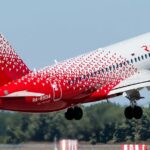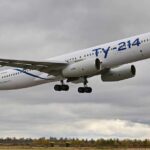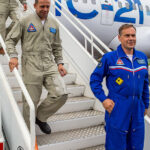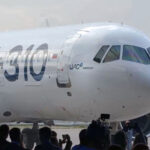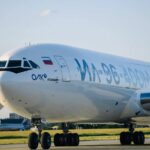At a meeting with members of the government on 19 July, Russian President Vladimir Putin said that he expects to increase the production of domestic civil aircraft, while the head of state rebuked Transport Minister Vitaly Savelyev for excessive trust in the past years to Western aircraft manufacturers. The recording of the meeting is available on the video hosting RuTube.
After Vitaly Savelyev’s report on the rising cost of passenger air travel and airlines’ need for aircraft, the president reminded the minister of one of the conversations held in the Kremlin.
“Here you said about the reasons for the growth of tariffs, the growth of ticket costs, including those related to logistics, the delivery of necessary spare parts and so on. Remember, when you were still Aeroflot’s head, I persuaded you to order as many domestic aircraft as possible, you and I even fought about it – you told me that Western partners are reliable, everything is so good, and they are good,” Vladimir Putin reminded the head of the Transport Ministry, who served as Aeroflot’s CEO from 2009-2020.
“But now our aircraft manufacturers, of course, cannot expand their production capabilities overnight, it will require a certain amount of time even though the order has appeared, increased. This is also a factor that is connected with the increase in tariffs,” the head of state stated.
“I very much expect that in contact with colleagues from the production sector, from the Ministry of Industry, this task will also be solved, and the transport needs will be met,” Putin stressed.
In February 2017, Vitaly Savelyev, in a large interview with TASS, made a significant emphasis on Aeroflot’s achievements in receiving various international prizes and awards, the diplomas of which adorned the walls of his reception room. “Previously, Aeroflot did not actually occupy high places in international ratings, there was nothing to hang. These plaques are a visual aid for employees. And for visitors who come here. So they can see how the company is developing. We have something to show from what we have done in recent years,” the then head of the flagship carrier proudly told the journalist.
At the same time, when the conversation turned to domestic aircraft, Vitaly Saveliev said “that Aeroflot does not see a place for these machines in its fleet yet”. During his time as Aeroflot’s head, the Il-96-300s were decommissioned in March 2014, and before that, in 2010, the airline got rid of the Tu-154s. “The press called me a killer of the domestic aviation industry. Well, what kind of killer am I, God forbid. These Tushkas were excellent aircraft, but 15-20 years ago. They were fuel-intensive, consumed too much paraffin,” Savelyev explained.
“We had a long experience of operating six Il-96s, which showed that in terms of process economics it is a costly aircraft. We are in business, we talk about efficiency and count fuel consumption per seat-kilometre. If a machine eats more than its Western competitors, no one will buy it. Everything must be reasonable. If we learn to make equipment at the level of world standards, then you are welcome,” he said.
In June 2010, during Russian President Dmitry Medvedev’s visit to the United States, the Boeingophile lobby managed to secure the purchase of 50 B737 airliners from Boeing for a total of $4 billion with an option to purchase 15 more such aircraft. As a result, at a joint press conference with the Russian president, US President Barack Obama proudly reported on the results of the summit talks: Russia is buying 50 Boeing aircraft from the US, which will provide America with thousands of additional highly skilled jobs. The Aeroflot Group, whose controlling interest was and is owned by the Russian Government, has provided the welfare of the United States of America.
According to an Airbus report published in autumn 2011, over the next 20 years Russian airlines were expected to purchase 1,006 passenger airliners with 100 seats or more at a total cost of $95 billion, with Airbus, according to the executive vice president of the airline empire, intending to sell us “at least half of all airliners delivered over that period”. Earlier Boeing also published its forecast, according to which airlines in Russia and CIS countries will buy more than 1000 new airliners in the next 20 years. And Boeing was probably counting on at least the other half.
In the early 2000s, Genrikh Novozhilov, General Designer of the Ilyushin Design Bureau, asked German Gref (who headed the Ministry of Economic Development in 2000-2007) for state guarantees to support the Il-114 regional turboprop aircraft: “German Oskarovich,” I said to Gref, “I am not asking you for money, I am asking you for guarantees that this aircraft will be needed! – I’m not asking you for money, I’m asking for guarantees that this aircraft will be needed!”. – “Genrikh Vasilyevich, our airlines have weak muscles. When they get stronger, then we can talk about guarantees.” I answered him: “When your airlines get stronger, we will safely stretch our legs,” recalled Genrikh Novozhilov.
Returning to Vitaly Saveliev, it is appropriate to recall his position on import substitution, which he outlined in the same TASS interview.
“We buy imported aeroplanes, and they, no matter what anyone says, are prepared much more seriously and of higher quality. What is the problem here? No aircraft-building corporation ─ neither American nor European ─ does everything by itself. The world works in co-operation. We want to produce ourselves. In my opinion, it would be better to keep the part of the aircraft where Russia is the best at using critical technologies. For example, we make the landing gear from titanium, the landing gear pram. This is our niche,” he expressed his view on the place of the Russian aircraft industry in the global aircraft construction market.
The Russian President’s rebuke to the Minister of Transport is absolutely fair. Vitaly Savelyev, being the head of a state-owned airline, was busy promoting the interests of foreign partners, forgetting about the interests of his country.


